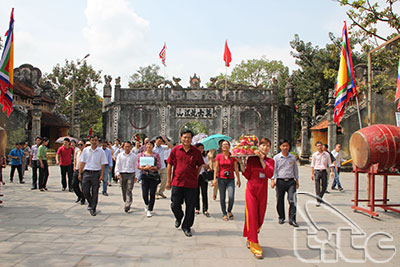As many as 400,000 pilgrims have flocked to the Con Son-Kiep Bac historical site in the northern province of Hai Duong since the first days of the Year of the Horse.

According to the head of the site’s management board Nguyen Khac Minh, the relic area welcomed at least 15,000 visitors a day. Particularly, more than 50,000 visitors arrived in the area to attend the 2014 Con Son-Kiep Bac spring festival from February 13-16.
Con Son-Kiep Bac was recognised as a national heritage site in 1962 and a special national heritage site in 2012.
Last year, the Con Son-Kiep Bac spring and autumn festivals received national intangible cultural heritage status.
Covering an area of more than 8 hectares in Chi Linh town, the Con Son-Kiep Bac historical site is closely associated with the lives and careers of Tran Hung Dao and writer Nguyen Trai (1380-1442), who was recognised as a Great Man of Culture of the World.
Tran Hung Dao, whose real name is Tran Quoc Tuan, acted as the Supreme Commander of Vietnam during the Tran Dynasty, leading Vietnamese troops to repel three major Mongolian invasions in the 13th century. The Mongols succeeded in conquering most of Central Asia and Eastern Europe, but never got a foothold in Dai Viet (as Vietnam was then called).
He died on September 5, 1300 at the age of 70. A temple called Kiep Bac was built in Hai Duong province to remember him.
The Kiep Bac temple festival is held annually to commemorate and pay tribute to national hero Tran Hung Dao in the eighth month of the lunar year (from September 8-13, 2014).
This year’s Con Son – Kiep Bac spring festival marked the 680th death anniversary of Huyen Quang Ton Gia (1334-2014), the third progenitor of Truc Lam Zen Buddhism, and honoured Zen Buddhism’s great contribution to the unity of religions and national protection as well.